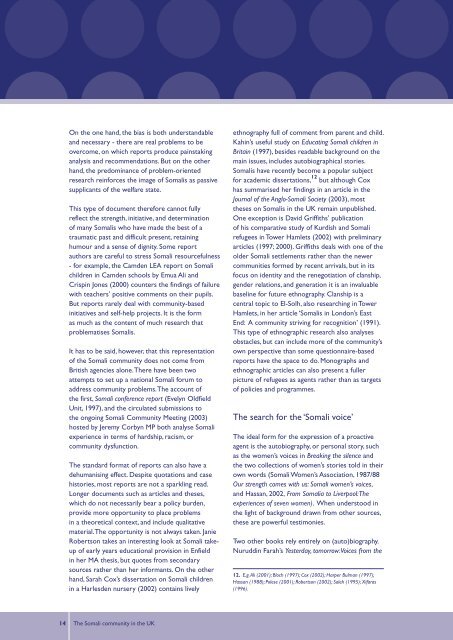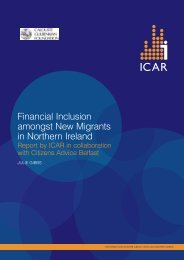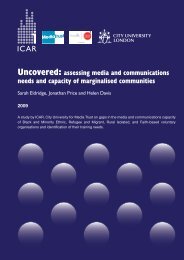The Somali community in the UK: What we know and how we ... - ICAR
The Somali community in the UK: What we know and how we ... - ICAR
The Somali community in the UK: What we know and how we ... - ICAR
You also want an ePaper? Increase the reach of your titles
YUMPU automatically turns print PDFs into web optimized ePapers that Google loves.
On <strong>the</strong> one h<strong>and</strong>, <strong>the</strong> bias is both underst<strong>and</strong>able<br />
<strong>and</strong> necessary - <strong>the</strong>re are real problems to be<br />
overcome, on which reports produce pa<strong>in</strong>stak<strong>in</strong>g<br />
analysis <strong>and</strong> recommendations. But on <strong>the</strong> o<strong>the</strong>r<br />
h<strong>and</strong>, <strong>the</strong> predom<strong>in</strong>ance of problem-oriented<br />
research re<strong>in</strong>forces <strong>the</strong> image of <strong>Somali</strong>s as passive<br />
supplicants of <strong>the</strong> <strong>we</strong>lfare state.<br />
This type of document <strong>the</strong>refore cannot fully<br />
reflect <strong>the</strong> strength, <strong>in</strong>itiative, <strong>and</strong> determ<strong>in</strong>ation<br />
of many <strong>Somali</strong>s who have made <strong>the</strong> best of a<br />
traumatic past <strong>and</strong> difficult present, reta<strong>in</strong><strong>in</strong>g<br />
humour <strong>and</strong> a sense of dignity. Some report<br />
authors are careful to stress <strong>Somali</strong> resourcefulness<br />
- for example, <strong>the</strong> Camden LEA report on <strong>Somali</strong><br />
children <strong>in</strong> Camden schools by Emua Ali <strong>and</strong><br />
Crisp<strong>in</strong> Jones (2000) counters <strong>the</strong> f<strong>in</strong>d<strong>in</strong>gs of failure<br />
with teachers’ positive comments on <strong>the</strong>ir pupils.<br />
But reports rarely deal with <strong>community</strong>-based<br />
<strong>in</strong>itiatives <strong>and</strong> self-help projects. It is <strong>the</strong> form<br />
as much as <strong>the</strong> content of much research that<br />
problematises <strong>Somali</strong>s.<br />
It has to be said, ho<strong>we</strong>ver, that this representation<br />
of <strong>the</strong> <strong>Somali</strong> <strong>community</strong> does not come from<br />
British agencies alone. <strong>The</strong>re have been two<br />
attempts to set up a national <strong>Somali</strong> forum to<br />
address <strong>community</strong> problems. <strong>The</strong> account of<br />
<strong>the</strong> first, <strong>Somali</strong> conference report (Evelyn Oldfield<br />
Unit, 1997), <strong>and</strong> <strong>the</strong> circulated submissions to<br />
<strong>the</strong> ongo<strong>in</strong>g <strong>Somali</strong> Community Meet<strong>in</strong>g (2003)<br />
hosted by Jeremy Corbyn MP both analyse <strong>Somali</strong><br />
experience <strong>in</strong> terms of hardship, racism, or<br />
<strong>community</strong> dysfunction.<br />
<strong>The</strong> st<strong>and</strong>ard format of reports can also have a<br />
dehumanis<strong>in</strong>g effect. Despite quotations <strong>and</strong> case<br />
histories, most reports are not a sparkl<strong>in</strong>g read.<br />
Longer documents such as articles <strong>and</strong> <strong>the</strong>ses,<br />
which do not necessarily bear a policy burden,<br />
provide more opportunity to place problems<br />
<strong>in</strong> a <strong>the</strong>oretical context, <strong>and</strong> <strong>in</strong>clude qualitative<br />
material. <strong>The</strong> opportunity is not always taken. Janie<br />
Robertson takes an <strong>in</strong>terest<strong>in</strong>g look at <strong>Somali</strong> takeup<br />
of early years educational provision <strong>in</strong> Enfield<br />
<strong>in</strong> her MA <strong>the</strong>sis, but quotes from secondary<br />
sources ra<strong>the</strong>r than her <strong>in</strong>formants. On <strong>the</strong> o<strong>the</strong>r<br />
h<strong>and</strong>, Sarah Cox’s dissertation on <strong>Somali</strong> children<br />
<strong>in</strong> a Harlesden nursery (2002) conta<strong>in</strong>s lively<br />
ethnography full of comment from parent <strong>and</strong> child.<br />
Kah<strong>in</strong>’s useful study on Educat<strong>in</strong>g <strong>Somali</strong> children <strong>in</strong><br />
Brita<strong>in</strong> (1997), besides readable background on <strong>the</strong><br />
ma<strong>in</strong> issues, <strong>in</strong>cludes autobiographical stories.<br />
<strong>Somali</strong>s have recently become a popular subject<br />
for academic dissertations, 12 but although Cox<br />
has summarised her f<strong>in</strong>d<strong>in</strong>gs <strong>in</strong> an article <strong>in</strong> <strong>the</strong><br />
Journal of <strong>the</strong> Anglo-<strong>Somali</strong> Society (2003), most<br />
<strong>the</strong>ses on <strong>Somali</strong>s <strong>in</strong> <strong>the</strong> <strong>UK</strong> rema<strong>in</strong> unpublished.<br />
One exception is David Griffiths’ publication<br />
of his comparative study of Kurdish <strong>and</strong> <strong>Somali</strong><br />
refugees <strong>in</strong> To<strong>we</strong>r Hamlets (2002) with prelim<strong>in</strong>ary<br />
articles (1997; 2000). Griffiths deals with one of <strong>the</strong><br />
older <strong>Somali</strong> settlements ra<strong>the</strong>r than <strong>the</strong> ne<strong>we</strong>r<br />
communities formed by recent arrivals, but <strong>in</strong> its<br />
focus on identity <strong>and</strong> <strong>the</strong> renegotiation of clanship,<br />
gender relations, <strong>and</strong> generation it is an <strong>in</strong>valuable<br />
basel<strong>in</strong>e for future ethnography. Clanship is a<br />
central topic to El-Solh, also research<strong>in</strong>g <strong>in</strong> To<strong>we</strong>r<br />
Hamlets, <strong>in</strong> her article ‘<strong>Somali</strong>s <strong>in</strong> London’s East<br />
End: A <strong>community</strong> striv<strong>in</strong>g for recognition’ (1991).<br />
This type of ethnographic research also analyses<br />
obstacles, but can <strong>in</strong>clude more of <strong>the</strong> <strong>community</strong>’s<br />
own perspective than some questionnaire-based<br />
reports have <strong>the</strong> space to do. Monographs <strong>and</strong><br />
ethnographic articles can also present a fuller<br />
picture of refugees as agents ra<strong>the</strong>r than as targets<br />
of policies <strong>and</strong> programmes.<br />
<strong>The</strong> search for <strong>the</strong> ‘<strong>Somali</strong> voice’<br />
<strong>The</strong> ideal form for <strong>the</strong> expression of a proactive<br />
agent is <strong>the</strong> autobiography, or personal story, such<br />
as <strong>the</strong> women’s voices <strong>in</strong> Break<strong>in</strong>g <strong>the</strong> silence <strong>and</strong><br />
<strong>the</strong> two collections of women’s stories told <strong>in</strong> <strong>the</strong>ir<br />
own words (<strong>Somali</strong> Women’s Association, 1987/88<br />
Our strength comes with us: <strong>Somali</strong> women’s voices,<br />
<strong>and</strong> Hassan, 2002, From <strong>Somali</strong>a to Liverpool: <strong>The</strong><br />
experiences of seven women). When understood <strong>in</strong><br />
<strong>the</strong> light of background drawn from o<strong>the</strong>r sources,<br />
<strong>the</strong>se are po<strong>we</strong>rful testimonies.<br />
Two o<strong>the</strong>r books rely entirely on (auto)biography.<br />
Nurudd<strong>in</strong> Farah’s Yesterday, tomorrow: Voices from <strong>the</strong><br />
12. E.g. Ali (2001); Bloch (1997); Cox (2002); Harper Bulman (1997);<br />
Hassan (1988); Polese (2001); Robertson (2002); Saleh (1995); Xifaras<br />
(1996).<br />
14 <strong>The</strong> <strong>Somali</strong> <strong>community</strong> <strong>in</strong> <strong>the</strong> <strong>UK</strong>

















